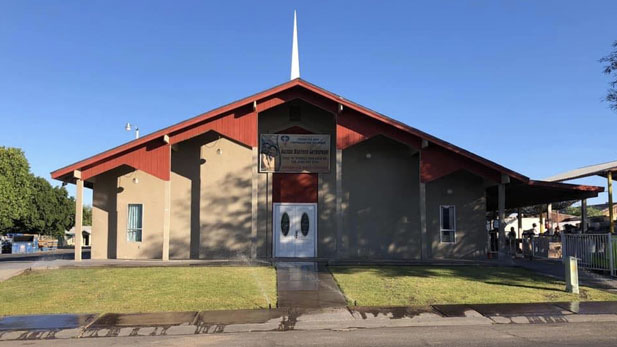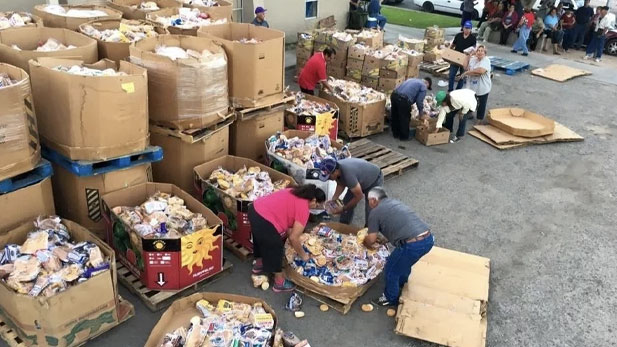 Gethsemani Baptist Church in San Luis, Ariz.
Gethsemani Baptist Church in San Luis, Ariz.Juliana Kim | NPR
For the past 23 years, Gethsemani Baptist Church in San Luis, Ariz., made it its mission to offer food to anyone who wanted it.
Through free meals and food drives, the church fed its local community, as well as hungry families in the greater region, like California and Mexico.
The church, which is about a 5-minute drive from the Mexican border, also served as a crucial support system for people who crossed into the United States, often fatigued, overwhelmed and with little to no belongings.
But that all came to a halt this month, according to a lawsuit filed in federal court by the church earlier this month.
The suit alleges that starting in 2022, the city of San Luis grew hostile over the church's food ministry, accusing the church of violating zoning laws by its use of a semi-truck to load and unload donations. The suit also alleges that the city incorrectly interpreted the food distribution work as commercial activity in a non-commercial zone.
The church and its pastor, Jose Manuel Castro, face up to $4,000 in city fines, the suit said. If the church continues its food ministry and the pastor receives one more citation, Castro could face a misdemeanor, which is punishable by another hefty fine, up to six months in prison, or both.
"The food ministry is the way that our church use to help people and share the gospel and the love of God," Castro told NPR.
The suit lists four defendants: the city of San Luis; its mayor, Nieves Riedel; acting city manager Jenny Torres; and a city code enforcement officer. It is asking the court to protect the church's right to exercise its religious beliefs by feeding those in need.
The church is represented by First Liberty Institute, a national law firm focused on religious liberty cases.
"The city should be working with Pastor Castro to feed the hungry. They should be affirming him, encouraging him, not threatening him and fining him" said Jeremy Dys, an attorney with First Liberty Institute.
The city's public information officer declined to comment.
 Gethsemani Baptist Church collects food from multiple states to support the local community, as well as churches and families in Mexico and California.
Gethsemani Baptist Church collects food from multiple states to support the local community, as well as churches and families in Mexico and California.'We are the first person to give the first meal, the first bottle of water'
The food ministry started in 1999 after a woman appeared in front of the church's door with 500 pounds of food and no one to give it to, according to Castro.
The woman had planned to take the boxes of food, which included rice, beans and flour, to Mexico but was denied entry by Mexican customs agents, he said. So, the next day, Castro and his church organized a food bank. By evening, all the food was dispersed.
Over the next two decades, Castro drove across the state on a weekly basis and sometimes, even to California and Nevada, to collect free food. As donations grew, so did the need — especially when it came to supporting people arriving from the Mexican border, he said.
Castro, who is originally from Mexico and moved to San Luis to start a Spanish-speaking church, said he and his staff not only provided food and blankets to migrants, but often also answered questions from newly arrived migrants like, what state they were in, when would they be able to contact their families, and about the immigration process.
"We are the first person to give the first meal, the first bottle of water," he said.
The number of people crossing the Mexican border into Yuma County has fluctuated over the years. According to U.S. Customs and Border Protection, the Yuma sector encountered migrants over 174,000 times in fiscal year 2023. The year before, the number of encounters were over 310,000. This year, there have been 27,000 encounters so far, according to CBP data.
Mayor Riedel, a Democrat who also immigrated to the U.S. from Mexico, told KAWC in December 2022 that the flow of migrants coming through San Luis had put a strain on the city's emergency services, like ambulances.
Police and a city enforcer showed up at the church to fine the pastor, suit says
The city of San Luis had long supported the church's food ministry, but that all changed in 2022 with the election of Riedel as mayor, according to the lawsuit.
In 2023, the city warned the pastor that semi-trucks were not allowed to be parked in the area where the church is located, per the San Luis zoning code, the suit said. For years, the church had relied on two semi-trucks to transport food and other donations from a warehouse to the church.
The city also told the church that its food distribution was a commercial operation and therefore only allowed in a commercial or industrial zoning district, the suit added.
The church tried its best to comply by unloading its semi-truck about a mile away from the church, but there was still pushback, Dys said.
In one incident this February, a semi-truck carrying a large donation of supplies mistakenly arrived at the church. According to the suit, the pastor directed the driver to the correct drop-off site. Yet, the next day, a city code enforcer and two police officers came to the church to hand code violations to Castro.
The encounter rattled Castro. He said when he now sees police near his church, he feels uneasy.
"I'm thinking right away, 'What happened now? What did I do?'" Castro said.
Starting in March, the church paused its food ministry completely and refused donations out of fear of getting in more trouble with the city. Nearly every day, Castro gets asked when the food ministry will reopen.
"I just hope and I pray and I wait for the city of San Luis to change their mind," he said.

By submitting your comments, you hereby give AZPM the right to post your comments and potentially use them in any other form of media operated by this institution.